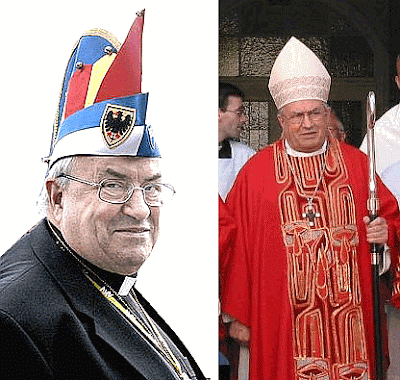The Voice of German Catholicism

Die Stimme des deutschen Katholizismus -
Actually he wanted "only" to be a Father: Cardinal Karl Lehmann. But the 71-year-old has dominated the face of the Catholic Church in Germany like no other. His withdrawal places his church in a difficult situation. And there is not a "natural" successor.
For 21 years, Cardinal Lehmann was President of the German Bishops' Conference,
This is a turning point, an end of an era. Cardinal Karl Lehmann (71), the face of the Catholic Church in Germany for nearly a quarter century dominated like no other: he was for almost 21 years Chairman of the Bishops' Conference, previously two years as a deputy, a presence on all TV channels and political podiums. His great predecessor, Joseph Höffner and Julius Döpfner were twelve or eleven years in office. Lehmann has set a record. Four times he was reelected. For the final time, after intense internal debate in 2005. Now he says that it was "time for a changing of the guards", whilst a life-threatening disease matured the decision and on 18 February, after the Spring Plenary Assembly of the Episcopacy he will resign. Bishop of Mainz, he will stay.
The timing of his departure makes "good sense", said the Cardinal. In fact, several important episcopal appointments have recently been made and there is a new generation of Chief Pastors. Nevertheless, Lehmann’s resignation puts his Church in a difficult situation. There is no "natural" successor. His deputy, Henry “God is not Catholic (Cathcon insertion of real live quote!) ” Mussinghoff (Aachen) has scarcely any chance. And the speculation on the church stock exchange for the period after Lehmann is rife that the newly appointed Archbishop of Munich and Freising must come to terms with the not uncomplicated Bavarian conditions.
Cardinal Lehmann, on his own account, has often overestimated his strength, and not paid attention to his health. Equipped with almost encyclopedic learning, he has been always timely in response to the contemporary scene and always willing to become involved, as he was always suspicious of a vestry-Christianity. He has gone from being born in 1936 to a teacher in the Swabian Sigmaringen to become a top interlocutor on politics, economy, science and culture. He worked on his lectures deep into the night. Although there are 27 diocesan bishops and 44 suffragans in Germany, the former Professor of Dogmatics was always the first port of call for organisers of meetings and conventions. Lehmann, a former assistant to the great Jesuit theologian Karl Rahner, obtained his doctorate in 1962 with a thesis on Martin Heidegger and is considered to be "liberal". He himself accepted this assessment with only a caveat: if the "liberal" refers to preparedness to dialogue, to discourse and discussion that "does not mean a lack of a standpoint." After all his motto reads: "Stand firmly in the Faith." (Cathcon- some might find this rather an ironic motto, especially if they remember his TV performance when he went wobbly on the reality of the afterlife)
Conflict with the Pope on pregnancy problems counseling
For 15 years, Lehmann taught dogmatics in Mainz and Freiburg, the "best time of my life". In 1983, he, was made at 47 years old, Bishop of Mainz. Two years later, he served as Vice Chairman to Cardinal Höffner in the Bishops' Conference. Then in a 1987 church sensation: Not Cardinal Friedrich Wetter (Munich), but the Chief Pastor of Mainz will be Höffner’s successor. Rome is not amused. In 1988, the new President was a negotiator in the turmoil about the appointment desired by the Pope of Cardinal Joachim Meisner as Archbishop of Cologne. And again a year later, the Berlin Wall has fallen, the Berlin bishop's Conference has to be integrated into the German Bishops’ Conference. In the 1990s, all his strengths are bound into the dispute over the legally required advice to pregnant women.
Lehmann fought against the Catholic "opt-out", but like his brothers, has to bow to the power of word of the Pope. That leaves wounds, which are still not healed. Only in 2001, and also in the second round, did the Bishop’s Conference chairman obtain Cardinal's status. When he received the insignia of his new dignity, Lehmann is so honoured that even the German Protestant
Lehmann is a "Roman"
Karl Lehmann - at a distance to Rome? There are some among traditionalists who even today suppose an anti-Roman sensibility. It allows the Cardinal to point out that he received that his religious formation especially in Rome. He received two doctorates from the Pontifical University "the Gregorian". Lehmann is a " Roman". But one who, despite his veneration of the "Roman School" of the Jesuits has retained an independent view. It was, he admits, always liberating for him and a great benefit not only during the study, but of how to understand with St. Ignatius, "that the love of the Church and loyalty to the Pope, includes and does not exclude criticism of the reality which needs reform". All obedience and all the criticism can only have meaning, when the unadorned Gospel is given its space, and while it can be damaged, it allows again the purity of the church to be made visible.
With his renunciation of the presidency of the German Bishops' Conference the Cardinal, as he says, "wishes to step back." But he will continue to speak out of Mainz. He remains a member of important Roman bodies, and he has already indicated to what issues he will continue to devote passion: the difficult situation of ecumenism. Actually, he likes to tell his inner circle of friends that, yes, he had "only" wanted to be a priest. Lehmann has become more, an internationally known theologian and Cardinal and thanks to the media presence, the respected voice of German Catholicism.









.jpeg)

Comments